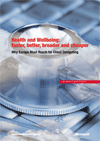
Europe's policy makers know full well what their challenges are. Put simply, everyone needs to do more, better, quicker, with greater involvement from their citizens and above all do this at lower cost. Nowhere are the challenges, the pain points, more evident than in health, where shrinking real budgets are set on a collision course with rising health costs and ageing populations. In addition, there are calls from all sides for patients to be more involved in the management of their own health and wellbeing. There are requests for innovation and technology developments to be driven by patients' needs. Add to the mix concerns about data security and privacy, and you have a perfect recipe for systemic stress.
In administration, as with most medicines, there is no "magic bullet". Economic constraints mean that everyone has to keep their feet firmly on the ground. And in the past few years a new ally has emerged: this new ally is called cloud computing.
The term cloud computing describes a new way of working whereby software, computing power, storage - a whole range of infrastructures and applications - reside in the "cloud", that is to say, off your own premises and accessed via the Internet. Instead of being a drain on capital and human resources, cloud computing enables rapid, agile and costeffective solutions.
Download Health and Wellbeing: Faster, Better, Broader and Cheaper (.pdf, 2.178 KB).
Download from eHealthNews.eu Portal's mirror: Health and Wellbeing: Faster, Better, Broader and Cheaper (.pdf, 2.178 KB).
For further information, please visit:
http://www.microsoft.eu/health